- Home
- S. J. Parris
Giordano Bruno 03 - Sacrilege Page 8
Giordano Bruno 03 - Sacrilege Read online
Page 8
Outside in the courtyard the day’s heat had ebbed away, leaving cool shadows and a gentle night breeze. It would be more comfortable to sleep out here, I thought, picturing Sophia lying alongside me among the hay bales stacked against the wall of the stable, under the stars. I wandered across to the open door of the stable building, to give her time to finish her ablutions in private, exchanged a few words with the stable-boy, gave him a groat to make sure our horses were well brushed down and fed for the morning, and strolled back slowly towards the inn, glancing up at the windows, some still lit by the flickering amber glow of candles. Occasionally the shadow of a figure would cross in front of the casement, and I looked up at the row of gabled windows in the attic storey, trying to work out which was ours. In one of those upper rooms, Sophia was undressing, unbinding her breasts, stretching out her long, aching limbs on the coarse sheets. I shook my head and tried to discipline my wayward thoughts. This business in Canterbury would be difficult enough without deliberately tormenting myself over Sophia and fantasies of what I could not—yet—have. The surest way to secure her trust and affection was to perform the role she required of me, which for the moment was that of trusted friend.
Between the bullying husband and his drunken, lusty son, she had seen enough of men whose only interest was what they could take from her. She had come to me because she believed I was different, and I wished her to see that she was right. Though I was a man like any other, I had learned during the years I lived as a monk to master the urges of the body that prove such a powerful distraction to men, especially those trying to concentrate on the life of the mind or of the spirit. As a sixteen-year-old novice I had served for a little time in the infirmary as assistant to the physician, and there I saw some among my brother Dominicans writhing in pain, burning up from within, clawing at festering sores, screaming every time they passed blood-streaked water, or sinking towards death in the incoherent ravings of madmen, all because of an ill-judged tumble with a whore or a serving girl. I had asked the brother physician what had brought these men—some of them not much older than me—to such a pass. “Sin,” he had replied emphatically, through clenched teeth. No further explanation was needed. These early lessons in the price to be paid for the fierce cravings of desire had led me to value my health and my sanity above the insistent clamour of my body; it was partly thanks to those poor tortured souls that I had chosen to devote myself to philosophy and worked hard to acquire the discipline needed to live the life of the mind. But Sophia was something different altogether; from the first moment I had seen her, across her father’s dinner table in Oxford, I had found her impossible to forget. Her return to me had all the irresistible force of an event decreed by the stars—or so I could almost believe.
I laughed drily at myself as I stopped to piss against a wall of the courtyard.
“Be another hot one tomorrow.”
I looked up; the speaker was a stocky man also relieving himself a few yards along from me. He nodded up at the cloudless sky.
“I think you are right,” I said, finishing my business and retying my breeches.
“We’ll have no harvest at all if we don’t get some rain soon,” he remarked, his stream still splashing vigorously against the stones. His words were slurred from drink and he swayed slightly as he continued to let loose the evening’s beer. I could not see his face in the half-light. Across the yard a horse whinnied, making me start. “Then there’ll be riots, you’ll see. Where you from, then?”
“Naples.” I took a step towards the inn, then added, “Italy,” when I saw there was no response. I had no wish to engage in small talk with this fellow, particularly about myself, but neither did I wish to give offence. Sophia and I were vulnerable enough without deliberately putting ourselves on the wrong side of fellow travellers.
“And the boy? What is he, your servant?”
It was a casual question, thrown over his shoulder as he finished, shook off the last drops, and tied himself away, but immediately I felt myself tense and the skin on my neck prickled. Whoever he was, he must have been watching us earlier and was sober enough to have recognised me. More than that, he had taken notice of Sophia.
“My assistant.” I answered him coolly enough, but my fists were clenched at my sides.
“Assistant, is it?” He laughed as he lurched towards me in the direction of the inn’s rear door. To my ear it sounded lascivious, though I knew I may have been oversensitive. “What’s he assist you with, then?”
“My business is books.”
“Oh, aye? Do you get much trade?”
“I make a living.”
Fortunately, it seemed he had little more to contribute on the subject of the book trade. He fell clumsily into step beside me as I made for the tavern door.
“Come and have a game of cards with us, my friend, you and your assistant. Too hot to sleep, night like this.” He clapped me on the shoulder; instinctively I flinched, though he was too drunk to notice.
“I thank you,” I said, moving a step away as we reached the threshold, “but we must make an early start tomorrow. Besides,” I added, trying to keep my tone light, “I’m afraid I am a hopeless card player, no matter what the game.”
“You’d be all the more welcome at our table, then,” he said, with a wheezing laugh that showed a few remaining brown stumps of teeth. I smiled and bade him good night, only realising as I climbed the stairs how I had been holding my breath. The man’s curiosity had seemed harmless enough, but it was further proof that Sophia and I made an odd sight travelling together, and one that attracted the eyes of strangers. We would need to be vigilant at every moment; one careless word or gesture, one instant of forgetting who we were supposed to be or failing to keep an eye over our shoulders, and our mission in Canterbury might be over before we even reached the city walls.
I gave a soft tap at the door. After a moment, I heard the lifting of the latch and slipped through into the warm darkness. The candles had been blown out; Sophia was standing behind the door, wrapped in a sheet from the bed. In the dim light from the open casement I saw that her shoulders were bare. Quickly I turned away. The room smelled faintly of sweat and something sharper, the private scent of a woman. I pulled my shirt over my head and lay down on the straw pallet, leaving my breeches on to hide my gently swelling erection, even though I knew she could see nothing in the soft blur of shadows.
“Tomorrow, as we ride,” I murmured, partly to distract myself, and partly to confirm, for my own benefit, that she was still awake, still conscious of my presence as I was of hers, “we must set to work. I need you to tell me as much as you can remember about your husband, every detail of his work, his habits, his friends, his enemies, his religion. No matter how insignificant it may seem. If we are to clear your name, we must first learn who else could have gained from his death.”
“His religion?” Through the dark, I could picture the quizzical expression that accompanied her tone; the slight wrinkling of the nose, the dip of the brows. “He was a lay canon of the cathedral, as I told you. Though his sense of Christian duty didn’t go beyond securing a position of influence for himself, as you also know.”
“But you and I know very well that a man’s public face does not always reflect the faith of his heart,” I whispered back. She remained silent. “Canterbury, like Oxford, is a place of tangled religious loyalties. The cult of the saint still holds many in thrall, I am told. And if your husband was a man with secrets, it’s not impossible that they involved matters of faith. It is, after all, a city with religion soaked into its stones.”
“My husband thought it all superstitious nonsense, the saint and the shrine,” she said, dismissively. “He regarded himself as a man of reason. Religion for him was a question of civic duty and social advancement. Whatever his secrets, I doubt they were concerned with faith.”
Since her voice implied that this was the last word on the subject, I turned over uncomfortably and closed my eyes. A timber creaked outside the room and
I sat bolt upright, hand on my knife, muscles tensed. But whether it was a footfall or merely the old building shifting in its sleep, there was only silence. Sophia laughed softly.
“Sleep, Bruno. It’s like having a watchdog in the room.”
I lay back, staring at the ceiling, one hand still resting lightly on the knife. A watchdog. It was how I felt. The room settled into the muffled stillness of night. Beyond the casement, the lonely cry of an owl floated through the dark. Sophia’s breathing grew deeper and more regular, almost lulling me out of my watchfulness until, long after I thought she was asleep, I heard her whisper, “Bruno?”
“Yes?”
“From now on,” she said, “let us not speak about Oxford. The past is gone. I was someone else then. I want to forget everything that happened there. Those terrible murders,” she added, after a while, barely audible. “And then my husband. Violent death seems to touch everyone who comes near me.”
There was a slight break in her voice, a note of despair that restrained me from telling her not to exaggerate. Sophia had known more than her share of misfortune in her young life, but this century is indifferent in its cruelty, and we are taught to regard suffering as our due. Her father and her aunt would no doubt say that she had been the author of her own troubles, that they were a punishment from God because she would not be submissive as a woman should. Someone with less orthodox views—someone like me, for example—might more generously suggest that Sophia’s only fault was to be born with intelligence, an enquiring mind, and a yearning for independence in a world where those qualities are seen as positively dangerous in anyone, let alone a girl. There was only one woman in England who had the freedom to indulge her intellect and her passion, and even her throne could not protect her from daily threats upon her life. I said none of this.
“But your past has shaped who you are.” I turned onto my side so that I was facing her bed; despite the darkness, I knew she was looking at me. “You carry it with you, even if you would rather not.”
“No.” She spoke firmly. “I want only to begin again, once this is all over. I will be no one’s daughter, no one’s mother, no one’s sister, no one’s wife. Everyone has gone. I wish to live like you, Bruno, with no ties. It must be a wonderful thing, to have such freedom.”
I said nothing. She was twenty years old; how could I make her understand that exile was not freedom, that solitude was not necessarily liberty? I was tired of travelling; the yearning to belong somewhere, to rest in the knowledge of a secure position, seemed to grow stronger with every year that passed. What she saw as my freedom had been forced on me by the Roman Inquisition.
I shifted again onto my back, the straw pricking at my skin through the thin sheet, and watched the frail moonlight slowly spread across the ceiling. Sophia’s breathing slowed again; occasionally she gave a little moan in her sleep, a reminder of her warm presence, while I lay awake, tormented and watchful, my ears straining for any sound of a tread on the stairs.
Chapter 5
We reached Canterbury by noon on the fourth day. Alone, I could have made the journey in less time, but Sophia was increasingly suffering the pains of long hours on horseback, and though she never complained, I reasoned it was better to take the journey at a slower pace, for her sake and for the horses’. My anxiety only increased each time we rode into an inn yard at dusk. The second night we spent in Rochester, a small town straddling the river estuary, where I bought some cloth and had it cut into makeshift kerchiefs we could tie around our faces to keep from breathing the dust. The third night we stopped in a village by the name of Faversham, where the clamour of the gulls and cool salt breeze made me long for the nearby sea. That night, she stood by the open window for a long time after I had blown out the candle, looking into the blue-black distance without speaking; when I tentatively approached and she turned, I realised that she was crying. I didn’t ask why, merely allowed her to rest her forehead against my shoulder until the moment passed. Before she got into bed, she touched my hand lightly, twining her fingers with mine for the space of a breath, as if to say thank you. Neither of us spoke, but I felt a surge of hope as I stretched out uncomfortably on my pallet, as if something essential had been communicated without the need for words.
We kept to ourselves, spoke as little as possible in the company of strangers, and survived the three nights and the hard ride with few unwelcome attentions. In every village where we broke our journey to water the horses and buy bread, rumours of the plague travelled before us, quick as flames through dry tinder; the old pilgrim road crawled with refugees with few belongings and less money, and the taverns were closing their doors to many. The townspeople wanted as little as possible to do with travellers from London; we were fortunate that money still spoke with a voice louder than fear.
A mile or so outside the walls of Canterbury we stopped in the village of Harbledown to let the horses drink. It was a pretty enough place, surrounded by orchards, no more than a few houses straggling along a single street which rose steeply towards the city in the distance. We led the horses off the road by an old almshouse and found a spot in the shade to sit down and prepare ourselves for the riskiest part of our journey. My head ached and my throat was gritty with dust, despite the kerchief.
“If the plague fears have reached Canterbury, we may find them more vigilant than usual at the gates,” I said, passing Sophia a leather bottle of small beer, warm now from hanging by my side along the road, but better than nothing. “Though the fact that everyone has a cloth tied around their face ought to work to our advantage. If they stop us, just keep your eyes down, your cap low over your face, and your mouth shut. We can pretend you are a mute. You shouldn’t find that too hard,” I couldn’t help adding, at the sight of her sullen expression.
She reached for the bottle, held my gaze for a long moment, enough to be sure that I knew she was still angry with me, then took a swig and looked pointedly away, squinting into the sun above the trees. For the best part of an hour she had refused to speak, ever since I had broken the news to her that morning that she would not be able to stay with me in Canterbury and would need to presume again on the hospitality of her Huguenot friends. I had expected her to be displeased by the idea, knowing she would fear for their safety, but I had not anticipated the flash of fury it provoked. She had railed at me, accusing me of reneging on my promise to help her, until I pointed out sharply that we were not the only travellers on the road and that shrieking like a girl-child was the best way to give herself up before we even reached the gates. She had fallen silent after that and remained so, with the occasional simmering glance from beneath her cap, until we stopped.
Now she propped herself up on one elbow and regarded me dispassionately before offering me the bottle. I took a brief sip and winced; my stomach had been feeling queasy since I first awoke and the heat of the day was not improving the symptoms.
“What if the French houses have been searched, looking for me?” Sophia said. “Someone will have told the constables that I was friends with Olivier, I am sure of it.”
“Then you should be all the safer. You have been gone from Canterbury a fortnight; if the authorities have already searched the city, they will not expect you to return.”
“I still don’t see why I can’t come with you, if I am supposed to be your servant.” She tore up a clump of grass with some force, then flung it away as if she found it offensive.
“Because innkeepers, and especially their wives, are the most professionally inquisitive people in all creation,” I said impatiently. “Their whole business is to observe and speculate on the travellers who come through their doors. We’ve been lucky so far, but any more than one night in the same hostel and someone will deduce right away that Kit is not what he claims to be. No.” I shook my head. “Lie low with the Huguenots. I will be enough of a curiosity on my own.” I rubbed a hand across my chin; four days’ growth of dark beard only reinforced the foreignness of my appearance, especially now that the sun had t
anned my face to a colour it had not been since I was a boy running free all day on the slopes of Monte Cicada. My hair, too, had been neglected over the past weeks when I was preoccupied with finishing my book; I could not remember the last time I paid a visit to the barber, and it had grown so that it fell across my eyes at the front and curled over my collar at the back. “One of my first tasks once we are inside the city gates must be to get a shave and a haircut,” I complained, pushing my fringe back from my face.
“You look better with no beard,” she remarked, her voice brighter. “Younger, I mean. It suits you.”
I glanced up, surprised, but she remained preoccupied with plucking blades of grass and scattering them around her and did not look at me. I was reminded again of how little I understood a woman like Sophia. I hardly considered myself an expert on the ways of women, but it had been eight years since I cast off my Dominican habit and with it my vows, and at the court of Paris I was given ample opportunity to observe the flirting and simpering of fashionable ladies at close quarters. Sophia had learned none of these wiles, yet her artless frankness was far more disarming; she could offer a compliment as casually as remarking on the weather and every time, like a fool, I allowed it to quicken a little spark of hope.
“It’s a pity we can’t get you a beard somehow,” I said, after a moment’s silence, watching how the shadow of the leaves fell across her smooth cheek. “It would help your concealment no end.”
“My aunt had the beginnings of one,” she said, looking up with an unexpected grin. “She was forever trying to pluck hairs from her chin. I suppose we can’t wait for me to reach her age.”
“If we don’t make your disguise convincing, you won’t live to reach her age,” I said, and immediately regretted it; her smile vanished on the instant and her eyes clouded again. She returned to pulling up the grass with renewed force.

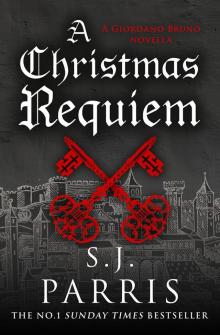 A Christmas Requiem
A Christmas Requiem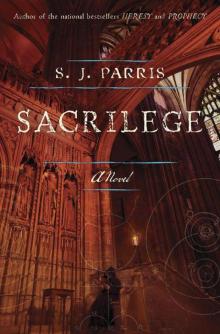 Giordano Bruno 03 - Sacrilege
Giordano Bruno 03 - Sacrilege The Dead of Winter: Three gripping Tudor historical crime thriller novellas from a No. 1 Sunday Times bestselling fiction author
The Dead of Winter: Three gripping Tudor historical crime thriller novellas from a No. 1 Sunday Times bestselling fiction author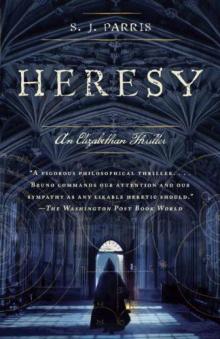 Giordano Bruno 01 - Heresy
Giordano Bruno 01 - Heresy The Dead of Winter
The Dead of Winter Treachery (2019 Edition)
Treachery (2019 Edition) The Academy of Secrets
The Academy of Secrets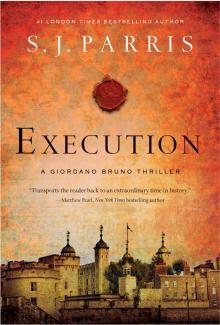 Execution
Execution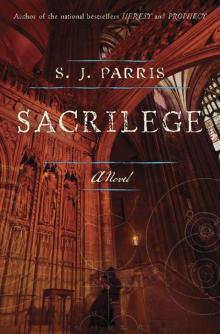 Sacrilege: A Novel
Sacrilege: A Novel Prophecy
Prophecy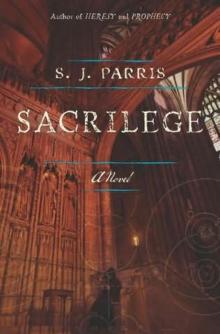 Sacrilege gb-3
Sacrilege gb-3 Prophecy (2011)
Prophecy (2011) Treachery
Treachery Prophecy gb-2
Prophecy gb-2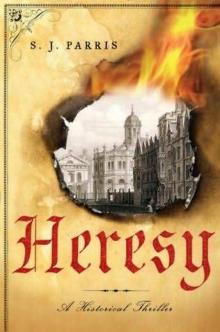 Heresy
Heresy